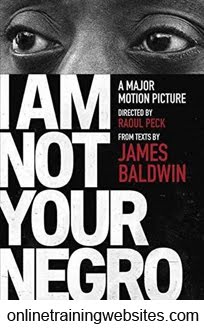I Am Not Your Negro: A Companion Edition to the Documentary Film Directed by Raoul Peck (Vintage International)
National Bestseller
Nominated for the Academy Award for Best Documentary
To compose his stunning documentary film I Am Not Your Negro, acclaimed filmmaker Raoul Peck mined James Baldwin’s published and unpublished oeuvre, selecting passages from his books, essays, letters, notes, and interviews that are every bit as incisive and pertinent now as they have ever been. Weaving these texts together, Peck brilliantly imagines the book that Baldwin never wrote. In his final years, Baldwin had envisioned a book about his three assassinated friends, Medgar Evers, Malcolm X, and Martin Luther King. His deeply personal notes for the project have never been published before. Peck’s film uses them to jump through time, juxtaposing Baldwin’s private words with his public statements, in a blazing examination of the tragic history of race in America.
This edition contains more than 40 black-and-white images from the film.
Published on: 2017-02-07
Released on: 2017-02-07
Original language: English
Dimensions: 8.00" h x .40" w x 5.50" l,
Binding: Paperback
144 pages
Review
“I Am Not Your Negro is a kaleidoscopic journey through the life and mind of James Baldwin, whose voice speaks even more powerfully today than it did 50 years ago. . . . He was the prose-poet of our injustice and inhumanity. . . . The times have caught up with his scalding eloquence.” - Variety
“A searing and topical indictment of racial prejudice and hatred in America that makes for uneasy viewing and is not easily forgotten. . . . Vividly intelligent.” - Hollywood Reporter
“A striking work of storytelling. . . . One of the best movies about the civil rights era ever made. . . . This might be the only movie about race relations that adequately explains with sympathy the root causes.” - The Guardian
“Thrilling. . . . A portrait of one man’s confrontation with a country that, murder by murder, as he once put it, ‘devastated my universe.’… One of the best movies you are likely to see this year.” - The New York Times
About the Author
JAMES BALDWIN (1924 - 1987) was a novelist, essayist, playwright, poet, social critic, and the author of more than twenty books. His first novel, Go Tell It on the Mountain, appeared in 1953 to excellent reviews, and his essay collections Notes of a Native Son and The Fire Next Time were bestsellers that made him an influential figure in the civil rights movement. Baldwin spent many years in France, where he moved to escape the racism and homophobia of the United States. He died in 1987.
RAOUL PECK is a filmmaker acclaimed for his historical, political, and artistic work. Haitian-born, he grew up in Congo, France, Germany, and the United States. His body of work includes the films The Man by the Shore (Competition, Cannes 1993); Lumumba (Cannes 2000, HBO); and Sometimes in April (2005, HBO). He is currently chairman of the French national film school, La Fémis, and recently completed his next feature film, The Young Karl Marx (2017).

A national bestseller when it first appeared in 1963, The Fire Next Time galvanized the nation and gave passionate voice to the emerging civil rights movement. At once a powerful evocation of James Baldwin's early life in Harlem and a disturbing examination of the consequences of racial injustice, the book is an intensely personal and provocative document. It consists of two "letters," written on the occasion of the centennial of the Emancipation Proclamation, that exhort Americans, both black and white, to attack the terrible legacy of racism. Described by The New York Times Book Review as "sermon, ultimatum, confession, deposition, testament, and chronicle...all presented in searing, brilliant prose," The Fire Next Time stands as a classic of our literature.
Brand: imusti
Published on: 1992-12-01
Released on: 1992-12-01
Original language: English
Dimensions: 8.00" h x .35" w x 5.14" l, .26 pounds
Binding: Paperback
128 pages
Review
"Basically the finest essay I’ve ever read. . . . Baldwin refused to hold anyone’s hand. He was both direct and beautiful all at once. He did not seem to write to convince you. He wrote beyond you." --Ta-Nehisi Coates
"So eloquent in its passion and so scorching in its candor that it is bound to unsettle any reader." --The Atlantic




No comments:
Post a Comment